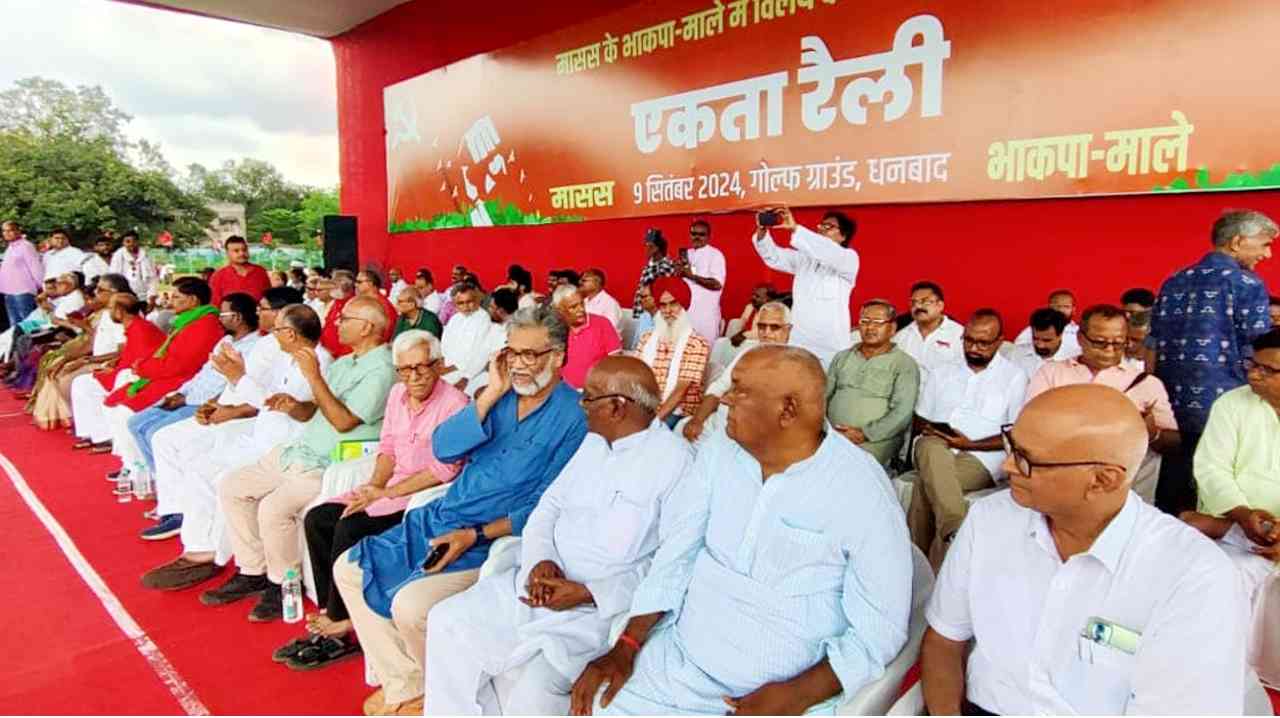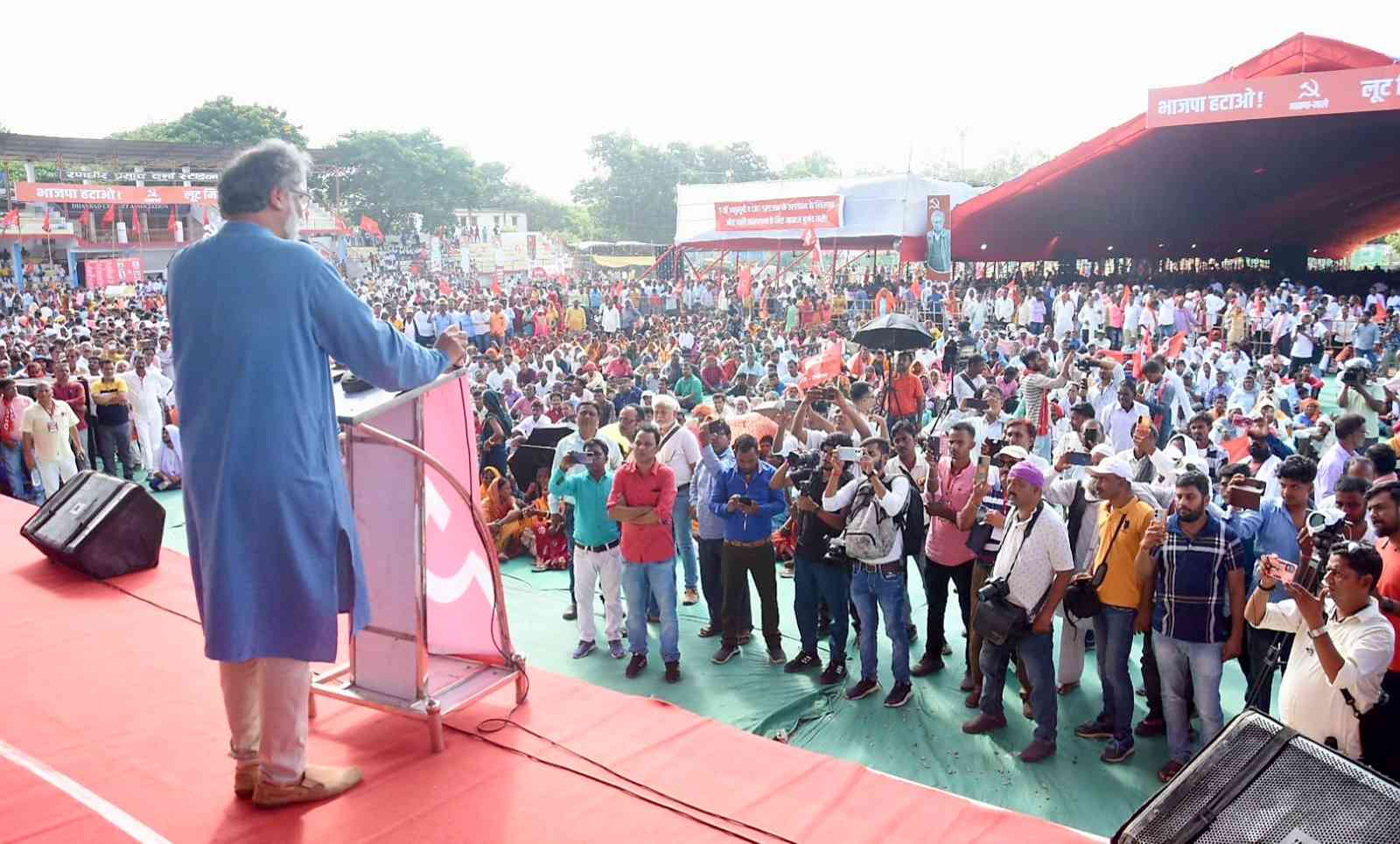Dhanbad "Ekta Rally" and the Message of Unity and Consolidation of Fighting Forces

On 9 September, Dhanbad, the coal capital of India in the Jharkhand-West Bengal border region witnessed a historic rally of the red flag. The occasion was the declaration of the merger of the Marxist Coordination Committee founded in 1972 by Comrade AK Roy with the Communist Party of India (Marxist-Leninist) founded by Comrade Charu Mazumdar in 1969. The spirited participation of tens of thousands of workers from Jharkhand coal mines and other factories and occupations, farmers, scheme workers, students and job-seeking youth and communist activists and progressive citizens made this rally a great success. At a time when the BJP is busy executing its conspiratorial campaign of defection and disintegration to weaken the opposition, the Ekta Rally has sent out a powerful and inspiring message of unity and consolidation of fighting forces to save Jharkhand and defend democracy.
This is a coming together of two great legacies of the communist movement in post-independence India. Since its formation in 1969 in the wake of the historic Naxalbari peasant uprising, braving severe state repression and feudal violence the CPI(ML) has rooted the communist movement deep into the Indian soil, drawing the most oppressed and exploited sections of Indian society into a sustained revolutionary assertion for social transformation and for the dignity and rights of poor and deprived Indians. The Marxist Coordination Committee has played a leading role in the struggle for coal nationalisation and in forging close bonds between the working class and Jharkhandi society in the Jharkhand movement. In the process the two streams have also produced iconic elected representatives of the people like AK Roy and Ramnaresh Ram, Mahendra Singh and Gurudas Chatterjee. The unification of these two streams marks an important step forward towards realising the vision of greater communist unity cherished by Comrades Vinod Mishra and AK Roy.
What lends added significance to this merger is the current context of Jharkhand and India. The protracted movement for Jharkhand was built on the dream of a state where the indigenous people of Jharkhand would get their due respect and rights and all sections of workers would prosper in this resource-rich centre of industrial development. But since its formation in November 2000 the state has been mostly under BJP rule and the dream of the Jharkhand movement has been subjugated to the Sangh brigade's project of turning Jharkhand into a police state and a laboratory of corporate loot and communal hate and violence. Comrade Gurudas Chatterjee was killed a few months before the foundation of Jharkhand, Comrade Mahendra Singh was assassinated in the middle of the elections in 2005, Adivasis began to be charged with sedition for demanding honest implementation of the Fifth Schedule of the Constitution, and Father Stan Swamy, the tireless campaigner for Adivasi rights, was taken to jail under UAPA and left to die without proper care.
Jharkhand's flagship public sector undertakings, the HEC in Ranchi, the coal industry in Dhanbad-Bokaro-Hazaribagh belt, the steel plant and allied factories in Bokaro, and power and fertiliser units are all being systematically weakened while the Adani group has been granted lucrative exemptions including an unheard of single factory SEZ in Godda where Adani burns overpriced coal imported from his own Carmichael mines in Australia to produce overpriced electricity for exclusive supply to Bangladesh. And now when the situation in Bangladesh has become volatile for the future of this arrangement, the Modi government has changed the rules again to allow domestic sale of power from Adani's Godda plant. In other words, Jharkhand is being treated as a captive state for India's crony capitalists. After Chhattisgarh and Odisha, the BJP is now targeting Jharkhand to complete the capture of India's prime mineral rich states.
If the Sangh brigade thus seeks to turn Jharkhand into a fascist laboratory, the fighting forces will have to unite to turn Jharkhand into a bastion of anti-fascist resistance. In the electoral arena, the 2024 elections have delivered a big blow to the BJP's fascist project by stopping the party well short of the majority mark. But while UP succeeded in drastically reducing the BJP's tally, in Bihar and Jharkhand the NDA managed to escape with moderate losses. In the forthcoming Assembly election, Jharkhand will have to inflict a decisive blow to the BJP's ambitious design to capture power through engineering defections in the JMM and manipulating the administrative machinery. The unification of the two leading Left forces of Jharkhand will inspire the communist ranks and the democratic movement in Jharkhand and beyond to intensify resistance to corporate plunder, communal hate and the fascist assault on democracy and the Constitution.

Charu Bhawan, U-90, Shakarpur, Delhi 110092
Phone: +91-11-42785864 | +91 9717274961 E-mail: info@cpiml.org

